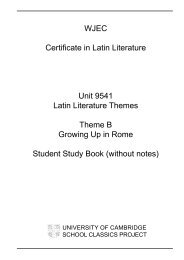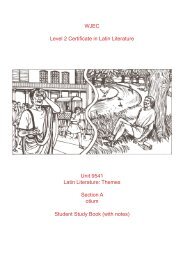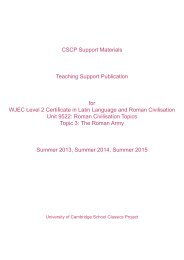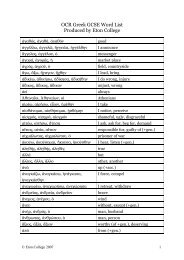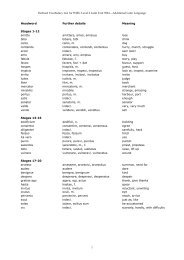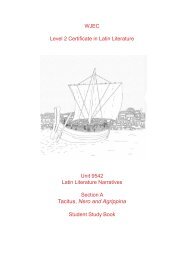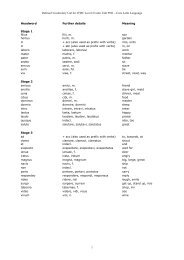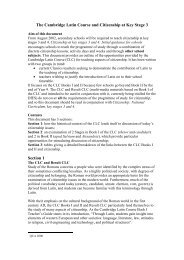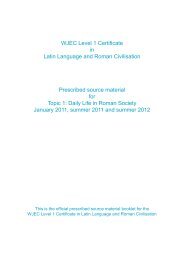44. What is the literal translation of vides? Are Ovid’s listeners actually seeing Troy at the moment? Aiming atnatural English, pick one of the following translations of vides or another of your own choice:(a) You are aware that …(b) You can see the example of …(c) You can picture Troy …(d) In your mind’s eye, remember how Troy …45. Although it took a very long time, what still happened in the end? Which of these translations, in your opinion,makes Ovid’s point most clearly?(a) but it was captured(b) but it was captured(c) but captured it was(d) but it was captured(e) but it was captured all the same.More than one answer is possible, and you may prefer a translation of your own.46. Translate the whole line, concentrating on making Ovid’s point clear: he acknowledges one fact (sero) but saysthat another fact (second capta) matters more.47. Sum up as briefly as possible the advice Ovid is giving in lines 1-10. Can you reduce it to three words? to asingle word?48. Does the argument “Other people have succeeded by persistence: therefore so will you” actually prove thatOvid’s advice is sound? Should Ovid have said “… perhaps so will you”, or does this make his encouragingwords too feeble?49. Complete these proverbs and words of advice, each of which gives similar advice to Ovid’s:If at first …Remember Robert the Bruce and …Constant dr…. (this is very close to one of Ovid’s examples; there are two versions)Can you think of any others?50. In lines 3-10, does Ovid succeed in introducing variety into his list of examples? For instance, how do theexamples in lines 9-10 differ from all the others? Do the examples in 3-4 differ from those in 5-8? If so, how?Does Ovid vary his way of presenting the examples? (Hint: look at the punctuation at the end of each line.)51. Even in Roman times, Ovid was occasionally criticised for “not knowing when to stop”. Would the passage hereactually have more impact, not less, if it had one couplet fewer? (Disregard the fact that one less couplet wouldhave meant less work for you.) If it were felt that the removal of a couplet would improve lines 3-10, which wouldyou axe? Which would you most wish to keep?52* Is Ovid’s advice good? Is his opinion more often right than an opposite view, that “a girl can always make a manleave her alone if she wants to”?53. Do you think young Roman males actually needed advice on this topic? Or is Ovid simply seeking to entertainhis readers and listeners?54* In AD 8 the emperor Augustus, who passed a number of laws intended to improve Roman morals, sent Ovidinto exile in the distant and unappealing town of Tomis, on the Black Sea, for the last six years of his life. Thissevere punishment was partly to punish Ovid for writing the Ars. In your opinion, was the emperor’s reason thathe didn't want his laws to be made fun of, or that he thought the poem was a seriously corrupting influence onRoman behaviour?55. There has been a lot of argument amongst scholars about the women whom the men are chasing in the Ars.(i) Roman girls were married young, sometimes as young as twelve, and were closely supervised beforemarriage, so it is most unlikely that the women mentioned by Ovid were young unmarried girls.(ii) The Ars often refers to the vir of a girl, which suggests that she is married (as Lesbia was, if she is identifiedwith Clodia), in which case Ovid is writing about adulterous love-affairs. At the beginning of the Ars, he saysvery firmly that he is not writing about married women, but he may be saying this in an unsuccessful attemptto protect himself from Augustus’ anger (see question 54).(iii) Another possibility, which is claimed by Ovid himself, is that the women are meretrices, meaning“courtesans”, i.e. very high-class prostitutes, who were normally freedwomen, and often interested andtalented in art, music and literature. They generally lived in fashionable style, on money and gifts presentedto them by each one’s lover(s), and could afford to be choosy about the men they took up with.(iv) A final possibility is that Ovid has no particular group of women in mind. This would be especially likely if theArs was intended purely for entertainment.70 WJEC Level 2 Latin Literature Unit 9541 Love and Marriage
56. Ovid's poem is a send-up of a particular type of Greek and Latin poetry (the technical term is "didactic" poetry)which gave information or instruction on subjects as various as hunting, astronomy, agriculture, beekeeping,fishing, physics, volcanoes and medicine. They were in verse not prose, but in other ways were rather likemodern day manuals with titles like "How to get through your driving test" or "How to cook" or even "How to passyour exam". One can imagine the expression on Augustus’ face when Ovid produced a didactic poem on "Howto pull birds" (not that Ovid would have put it so crudely).57* Many readers have felt that whether or not Ovid’s poem is a serious “handbook”, it contains some sensiblecomments and shows a shrewd understanding of human nature, both male and female. For example, do youagree with these comments in the Ars?(i) About a man who protests too loudly:qui nimium multis “non amo” dicit, amat.The man who keeps saying “I am not in love”, is.(ii) About girls who go to the theatre:spectatum veniunt, veniunt spectentur ut ipsae.They come to look, and they come to be looked at.58. You may be disappointed that Ovid’s poem is written entirely from the man’s point of view. Perhaps the girlsof his own day made the same grumble to Ovid himself. At any rate, <strong>Book</strong> III of the Ars, which Ovid claims hewrote by popular request, is addressed to girls and gives hints on how to attract a man. For example:si brevis es, sedeas, ne stans videare sedere. (videare = videaris)If you are short, sit down, lest when you are standing you seem to be sitting.59. When using adjective-and-noun phrases, Roman poets could take advantage of the fact that Latin word order ismore flexible than English. In English, word order usually points to the meaning of a sentence: "Dog bites man"doesn't mean the same as "Man bites dog". In Latin, however, meaning is indicated less by word order and moreby word ending: canis mordet hominem and hominem mordet canis both indicate that the dog is doing thebiting. So the Romans could use word endings to establish the meaning of a sentence and use word order forother purposes.One way in which a Roman poet could make use of Latin's flexible word order was his handling of adjective-andnounphrases. When the adjective and noun are separated by another word or words, and perhaps “wrappedup in”, or interlaced with, another adjective-and-noun phrase, the poet does not do this to baffle his readers orlisteners, but to achieve an effect. For example, if an adjective appears in a line of Latin verse, the listener willget ready for a noun agreeing with the adjective. Not that the listener is usually conscious of this. This is ratherlike the use of rhyme in English verse. If you hear the first line of a couplet:"And still they gazed, and still the wonder grew",you are subconsciously ready for a word which ends in "-ew" and are satisfied when the next line is:"That one small head could carry all he knew".The listener can enjoy the rhyme without needing to watch out for it.In the same way, the Roman listener who heard Ovid say ferreus in reciting line 5 of this extract would be readyfor a noun in the same case, number and gender, and near the end of the line the noun arrives. Look back at thepoem if you've forgotten it.The fact that Latin word order is so flexible gave a Roman poet a second very practical advantage: it made itsomewhat easier for him to obey the strict rules of Latin metre.60. If you are allowed to mark your copy of this extract, you could underline the adjective and noun in each phrase.When one phrase encloses or is interwoven with another, use two different types of underlining (long or short?different colours?) to distinguish the two phrases. You might then listen to the audio of the extract with themarked text in front of you. After listening once or twice, listen again, concentrating on following the meaning asclosely as possible, and letting your eyes and ears pick up the pattern of adjective-and-noun phrases.Answers30. Sextus is taller than Marcus.The second alternative literally means Sextus is taller from [i.e. measuring from] Marcus. Marcus is the standardor baseline from which Sextus is measured.(i) The elephant is bigger than the horse.(ii) This temple is more beautiful than that one.WJEC Level 2 Latin Literature Unit 9541 Love and Marriage 71
- Page 1:
WJECLevel 2 Certificate in Latin Li
- Page 4:
CIL 1.2.1211, Epitaph to Claudia -
- Page 7 and 8:
NotesWJEC Level 2 Latin Literature
- Page 9 and 10:
20. Read lines 5-8 (aloud if possib
- Page 11 and 12:
Follow your teacher's guidance over
- Page 13 and 14:
13. Read lines 4-8 (aloud if possib
- Page 15 and 16:
NotesWJEC Level 2 Latin Literature
- Page 17 and 18:
28. Read lines 8-11 (aloud if possi
- Page 19 and 20: NotesWJEC Level 2 Latin Literature
- Page 21 and 22: 47. Read lines 11-14 (aloud if poss
- Page 23 and 24: 61. Read lines 14-18 (aloud if poss
- Page 25 and 26: NotesWJEC Level 2 Latin Literature
- Page 27 and 28: The poems of Catullus, who lived in
- Page 29 and 30: NotesWJEC Level 2 Latin Literature
- Page 31 and 32: 27. Read lines 7-9 (aloud if possib
- Page 33 and 34: 37. Read lines 10-13 (aloud if poss
- Page 36 and 37: Catullus, Poem 8 - lines 1-5miser C
- Page 38 and 39: 18. According to Catullus in line 3
- Page 40 and 41: Catullus, Poem 8 - lines 6-8ibi ill
- Page 42 and 43: Catullus, Poem 8 - lines 9-11nunc i
- Page 44 and 45: Catullus, Poem 8 - lines 12-15vale
- Page 46 and 47: Catullus, Poem 8 - lines 16-19quis
- Page 48 and 49: 82. Translate the last three words
- Page 50 and 51: Catullus, Poem 70nulli se dicit mul
- Page 52 and 53: (ii) The person who ought to do som
- Page 54 and 55: Catullus, Poem 72 - lines 1-4diceba
- Page 56 and 57: Catullus, Poem 72 - lines 5-8nunc t
- Page 58 and 59: Catullus, Poem 83 - lines 1-2Lesbia
- Page 60 and 61: Catullus, Poem 83 - lines 3-6mule,
- Page 62 and 63: 24. et in line 6 is more than just
- Page 64 and 65: Ovid, Ars Amatoria 1.469-478, Advic
- Page 66 and 67: 15. In time, what do these animals
- Page 68 and 69: Ovid, Ars Amatoria 1.469-478, Advic
- Page 72 and 73: Martial, Epigrams 8.12, Marital equ
- Page 74 and 75: CheckCheckCheckTranslate these exam
- Page 76 and 77: Pliny, Letters 4.19, To Calpurnia H
- Page 78 and 79: Check12. Translate these examples:(
- Page 80 and 81: Pliny, Letters 4.19, To Calpurnia H
- Page 82 and 83: Pliny, Letters 4.19, To Calpurnia H
- Page 84 and 85: allowed in court (see question 30),
- Page 86 and 87: Pliny, Letters 4.19, To Calpurnia H
- Page 88 and 89: Pliny, Letters 4.19, To Calpurnia H
- Page 90 and 91: Pliny, Letters 4.19, To Calpurnia H
- Page 92 and 93: 77. The marriage (like Pliny’s tw
- Page 94 and 95: Pliny, Letters 6.24, Faithful unto
- Page 96 and 97: Pliny, Letters 6.24, Faithful unto
- Page 98 and 99: Check20. Another version of the wif
- Page 100 and 101: Pliny, Letters 6.24, Faithful unto
- Page 102 and 103: The following questions refer to Lo





